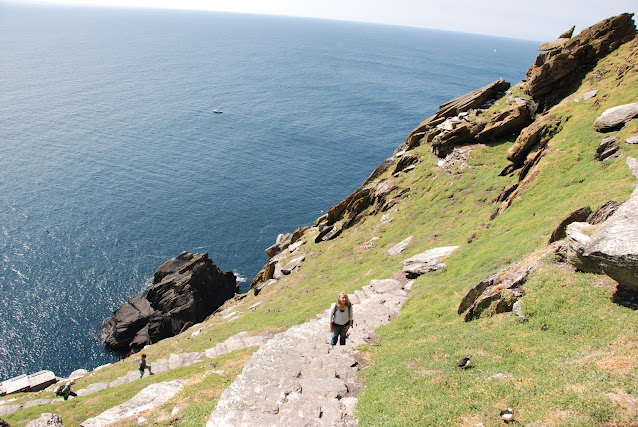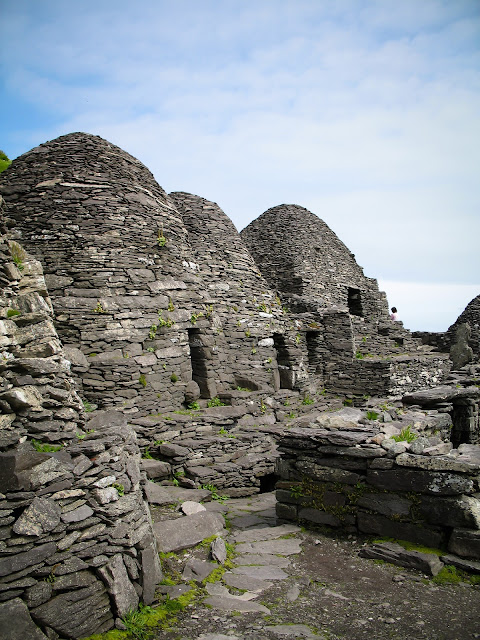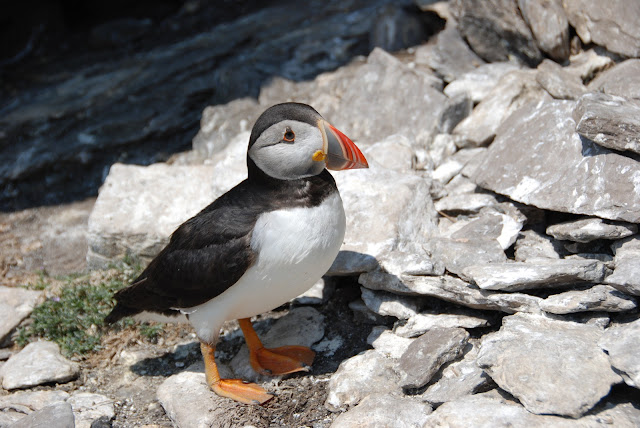By Donna Wichelman
In September
1910, the Irish writer and Nobel Prize-winning author George Bernard Shaw took
an open boat, manned by ten men on five oars to Skellig Michael, an island
seven miles offshore from the Irish coast. In a letter to a friend, he said of
the “pinnacled… caverned, minareted” island, “They landed me on the most
fantastic and impossible rock in the world… I tell you the thing does not
belong to any world that you and I have lived and worked in: it is part of our
dream world.”
 |
| Skellig Michael Island: County Kerry, Ireland, Courtesy of Dreamstime |
Indeed, the rock that rises seven hundred feet and is a mile around has an otherworldly atmosphere
about it. I know, because our family had the opportunity to tour Skellig Michael
in the summer of 2018. That same mystical quality is most likely why Lucasfilm chose
Skellig Michael to be Luke Skywalker’s Island Sanctuary on the planet Ahch-To
in the 2017 Star Wars epic, The Last Jedi.
Skellig Michael Island: County Kerry, Ireland: Donna's Gallery 2018
In an interview for Ireland
Calling, Mark Hamill said of the island that it was like nowhere he’d ever
been. “Skellig… [I was] up at the top… off to myself… at sunset… there were
the craggy rocks coming up, and I had the feeling ‘Oh my gosh, this is like being
in another world…’”
I’ve wondered if perhaps
the supernatural nature of Skellig Michael—named for St. Michael—may have something
to do, in part, with the sixth-century Christian monks who inhabited the
island. The island consists of two main Red Sandstone peaks—one 715 feet, where
an ancient hermitage exists, and the other 600 feet, where the main monastic
site exists. The valley between the two is called Christ’s Saddle.
On Skellig Michael—sometimes
referred to as the Rock of St. Michael—the monks of St. Fionán sought to get closer to God by living simple
lives in isolation far from shore. They carved a series of stone steps up a
steep climb to the monastic site, where there is an inner stone enclosure, and
built Beehive and boat-shaped stone edifices—six huts in which to live and two oratories
or prayer chapels in which to worship. There is also a cemetery and two large
terraces—the Upper and Lower Monk’s gardens.
Donna Climbing the Steep Stone Steps 600 feet to the Monastery: Donna's Gallery 2018
Beehive Huts and Oratories: Courtesy of Dreamstime
Oratory and Cemetery: Courtesy of Dreamstime
For over five hundred years,
the monks who made the island their permanent home lived a rudimentary
existence collecting rainwater in cisterns and living off birds and fish. They
also gathered birds’ eggs and feathers to trade with passing boats for cereals,
candles, and animal hides. Meanwhile, the monks spent their days praying,
copying Scripture, and tending their gardens.
Native Puffins on Skellig Michael: Donna's Gallery 2018
Lower Gardens, Skellig Michael: Donna's Gallery 2018
Stone Enclosure and Lower Garden, Skellig Michael: Donna's Gallery 2018
Neither Viking Raids in
the eighth century, nor harsh stormy gales could dissuade the monks from living a life of religious devotion on the island. It wasn’t until the late twelfth
century that the monks of St. Fionán finally decided to leave the
island for the priory founded at Ballinskelligs on the coast of the Iveragh
Peninsula.
Mark Hamill of Star Wars Fame, Courtesy of Dreamstime
More than nine hundred years later, while Skellig Michael has become a UNESCO World Heritage Site, another historic site has gained fame in Georgetown, Colorado—the Hamill House Museum. The original house was built in 1867, but William Arthur Hamill bought the house in 1874 and expanded it with the monies he accrued as Georgetown’s silver mining baron.
 |
Georgetown, Colorado Nestled in the Colorado Rockies: Courtesy of Dreamstime Hamill House can be seen in the lower left-hand corner. |
Originally from Liverpool, Lancaster, England, and a Victorian gentleman, William Hamill’s money, political prowess, and business acumen helped forge Georgetown’s rise to become the “Silver Queen” during the town’s silver mining heyday. By the time Colorado was awarded statehood in 1876, Hamill became known as the “gentleman from Clear Creek,” and his turn as a Republican state senator gave him respectability. In addition, by 1885, Georgetown’s largest group of immigrants was Irish, whose social and political organizations impacted the town.
Today, the Hamill House is open to the public and gives the visitor a peek into the lifestyle of the wealthy silver mining baron and his family. Christmas at the Hamill House invites the patron to enjoy an evening of Victorian holiday traditions in Hamill’s home, including food, wassail, caroling, and the traditional lighting of the Christmas tree. During the Christmas event in 2019 when I was doing research on the era for my Gilded Age historical romance, I had the privilege to meet some of William Hamill’s descendants.
Christmas at the Hamill House, Georgetown, Colorado: Donna's Gallery 2019
.JPG) |
| Wassail and Caroling, Hamill, House, Georgetown, Colorado: Donna's Gallery 2019 |
The astute reader might have guessed by now that Mark Hamill is none other than William Arthur Hamill’s great-great-great-grandson. Unfortunately, he wasn’t in attendance the night I participated in Christmas at the Hamill House.
Sitting at my desk writing this blog, I’m struck by the profound notion that there’s something bigger at work in our connections with one another than most of us realize. Perhaps it would behoove us to consider the interweaving of history in a much greater plan. Shaw and Hamill felt the otherworldliness of Skellig Michael, but possibly C.S. Lewis says it best when he says, "If we find ourselves with a desire that nothing in this world can satisfy, the most probable explanation is that we were made for another world." That's a thought worth pondering.
 Donna worked as a communications professional before turning to full-time writing. Her short stories, essays, and articles have appeared in various inspirational and secular publications. She has two indie-published novels in her Waldensian Series--Light Out of Darkness and Undaunted Valor on Amazon.com.
Donna worked as a communications professional before turning to full-time writing. Her short stories, essays, and articles have appeared in various inspirational and secular publications. She has two indie-published novels in her Waldensian Series--Light Out of Darkness and Undaunted Valor on Amazon.com.
Weaving history and faith into stories of intrigue and redemption grew out of Donna's love of history and English literature as a young adult while attending the United World College of the Atlantic—an international college in Wales, U.K. She still loves to explore peoples and cultures of the world, developing plots that show how God’s love abounds even in the profoundly difficult circumstances of our lives. Her stories reflect the hunger in all of us for love, forgiveness, and redemption in a world that often withholds second chances.


.JPG)
 Donna worked as a communications professional before turning to full-time writing. Her short stories, essays, and articles have appeared in various inspirational and secular publications. She has two indie-published novels in her Waldensian Series--Light Out of Darkness and Undaunted Valor on Amazon.com.
Donna worked as a communications professional before turning to full-time writing. Her short stories, essays, and articles have appeared in various inspirational and secular publications. She has two indie-published novels in her Waldensian Series--Light Out of Darkness and Undaunted Valor on Amazon.com.
.jpg)








Very interesting! Thanks for sharing.
ReplyDeleteThank you for posting today, and welcome to the blog! That Irish island is beautiful, and very other-worldly!! Thank you for giving me a way to travel without traveling!!
ReplyDeleteYou're welcome! It is truly a lovely setting and quite interesting setting. It is isolated though, so I can't imagine living there for any length of time. I hope you get to visit it someday!
DeleteWhat a fascinating story!
ReplyDeleteAmanda, thank you! It's a fascinating island and well-worth a visit if you every get the chance.
ReplyDeleteThank you for sharing this amazing journey! Wow!
ReplyDeleteKaren, thank you for reading. I'm glad you enjoyed it! Donna
DeleteThis was quite interesting. Thank you for this post.
ReplyDeleteMichelle, you're welcome, and thanks for reading. It's been my pleasure. Donna
ReplyDelete